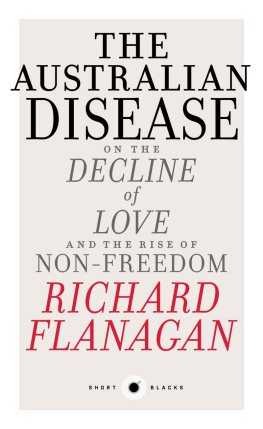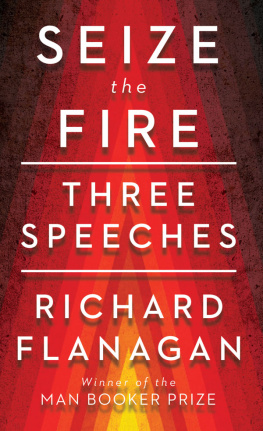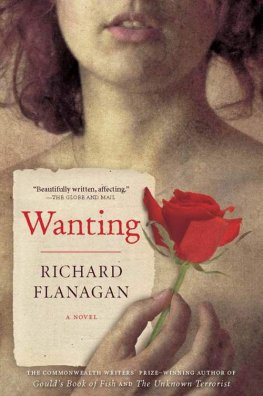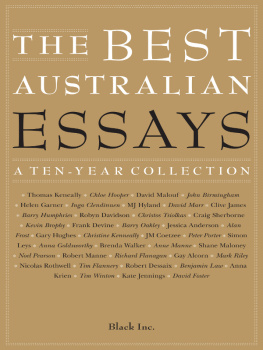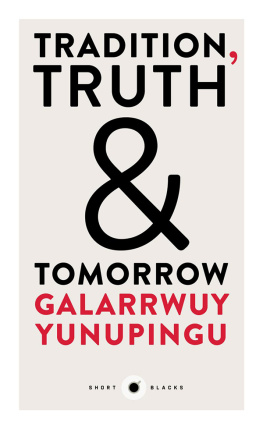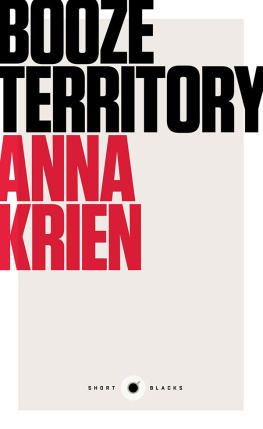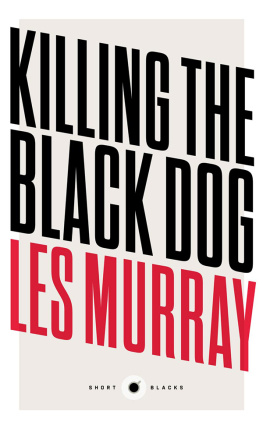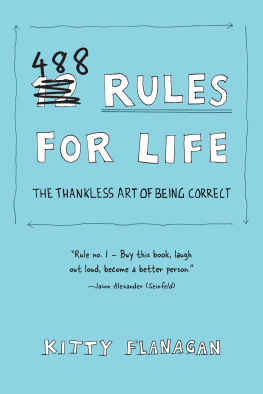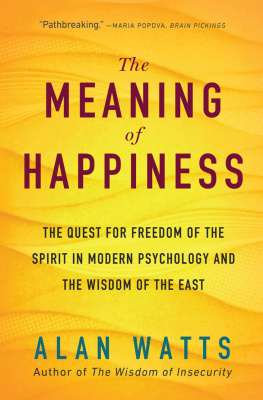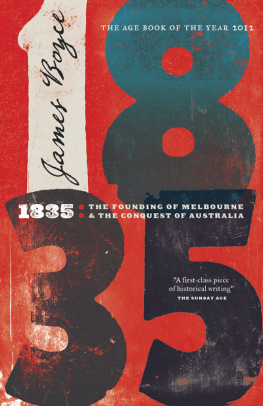SHORT BLACKSare gems of recent Australian writing brisk reads that quicken the pulse and stimulate the mind.
SHORT BLACKS
1 Richard Flanagan The Australian Disease:
On the decline of love and the rise of non-freedom
2 Karen Hitchcock Fat City
3 Noel Pearson The War of the Worlds
4 Helen Garner Regions of Thick-Ribbed Ice
5 John Birmingham
The Brave Ones: East Timor, 1999
6 Anna Krien Booze Territory
7 David Malouf The One Day
8 Simon Leys Prosper: A voyage at sea
9 Robert Manne
Julian Assange: The cypherpunk revolutionary
10 Les Murray Killing the Black Dog
11 Robyn Davidson No Fixed Address
12 Galarrwuy Yunupingu
Tradition, Truth and Tomorrow
Published by Black Inc.,
an imprint of Schwartz Publishing Pty Ltd
3739 Langridge Street
Collingwood VIC 3066 Australia
www.blackincbooks.com
Copyright Richard Flanagan 2011
Richard Flanagan asserts his right to be known as the author of this work.
Originally presented as Liberty Victorias Alan Missen Oration.Published in Quarterly Essay 44, Man-Made World, Black Inc., 2011.
This edition published 2015.
ALL RIGHTS RESERVED.
No part of this publication may be reproduced, stored in a retrieval system, or transmitted in any form by any means electronic, mechanical, photocopying, recording or otherwise without the prior consent of the publishers.
Flanagan, Richard, 1961 author. The Australian disease : on thedecline of love and the rise of nonfreedom / Richard Flanagan.9781863957618 (paperback) 9781921870491 (ebook) Short blacks ; no. 1.Social psychologyAustralia. Attitude (Psychology)Australia.ConformityAustralia. AustraliaPolitics and government21stcentury. AustraliaSocial conditions21st century.
306.0994
Cover and text design by Peter Long.
RICHARD FLANAGANs most recent novel The Narrow Road to the Deep North, won the 2014 Man Booker Prize.
The Australian Disease was originally presented as Liberty Victorias Alan Missen Oration, doubling as the Closing Address of the 2011 Melbourne Writers Festival.
G ood evening. I am afraid Richard Flanagan couldnt be here tonight and so I am here in his place. My name is Craig Thomson. You might have heard a lot in recent times about another Craig Thomson. I am not him. I am just a run-of-the-mill bloke who likes prostitutes. A lot. Theyre great. Really, really great. God Ive had some fun. You can do anything if you pay. Its incredible. I even had a Julie Bishop once. She said, You want the stare? I said, You get what you pay for.
Mates say, But how do you afford it? Mate.
I say, you find someone who has your name and a work credit card with a huge limit and you work out where this person is staying and you break into his room. Or just knock. Thats what I ended up doing. We got to know each other quite well, and well, hes so busy doing his job, I just borrow his wallet and his phone and ring up and do the ordering. He never seems to mind, he doesnt really seem to know who I am its sort of like a Philip K. Dick novel, doppelgangers and whatever and then you get down to business. Christ, I was there once, video camera and all, but he didnt seem to notice. Hed be talking to someone important. Like maybe Mark Arbib. Or somebody like that. Perhaps it was another universe or parallel dimension, the ALP, I dont know. All I know is that when I see Craig now he doesnt seem to remember me.
Anyway, Richard Flanagan asked me to read his speech and Im hoping to borrow his credit card later tonight, so I should begin.
*
How good it is to be here at the end of a marvellous fortnight that has seen literature celebrated in the most wonderful way possible. Whose heart hasnt lifted with joy at all that has taken place in our great city of fiction?
I speak, of course, of Canberra.
In the offices and lobbies and forecourts of Parliament House, the restaurants and bars of Manuka and Kingston, homage has been paid by our leaders to literature in the most sincere way possible, by life seeking to imitate art.
For on this, the fiftieth anniversary of Catch-22s publication, how inspirational it is to see a character clearly modelled on Joseph Hellers Major Major Major Major, forever absent and suddenly somehow supremely present, promoted by bureaucratic error that is the fault of a machine gone haywire in Major Major Major Majors case an early IBM computer, in Craig Thomsons case a late NSW Labor machine to centre stage of our nations public life.
And that, of course, is the catch. Because Craig Thomson shouldnt have been chosen and promoted by the ALP except that he was and now, of course, he cant be unchosen.
The question arises as to why the ALP endorsed someone like Craig Thomson for the last election, when much of his past would presumably already have been known in ALP circles. And having elevated him, why did the ALP keep promoting him? Why did Craig Thomson get the thumbs up from the Labor Party, why did the Labor Party think this man should be a leader, a lawmaker, a shaper of opinion and of our national future?
And the answer, perhaps, is one that goes to the heart of our present malaise: it is because Craig Thomson was a conformist. And in present-day Australia, it doesnt matter what you do or what you have done, so long as you conform to power. The only true crime in an ever-more bland Australia is to not conform. I dont mean to suggest that conformity is a national characteristic. It is an aspect of the human condition, but only one part. But of late it seems to have become a predominant condition of Australian life. And it is about this Australian disease of conformity that I want to speak tonight, and about how conformity deforms and destroys love and freedom.
Let me begin with a story my father once told me. During the war he was one of Dunlops Thousand, that now mythical group of POWs who endured the horrors of the Death Railway under the Japanese, led by a doctor called Weary Dunlop.
One day on the railway a digger called Slappy Oldham turned up to sick parade with a cigarette dangling from the corner of his mouth. An English major called Driscoll made a swipe at Slappy, which the POW evaded by the slightest move of his head.
Lucky you missed, said Slappy Oldham.
Driscoll angrily demanded to know why.
If youd touched me, said Slappy Oldham, Id have dropped you, you bastard.
Driscoll grew more agitated and was speaking of charges when Dunlop arrived. Slappy walked up to him.
You know that bastard Driscoll? said Slappy Oldham. He tried to swipe me, and I told him off.
Good on you, Slappy, replied Weary, to the amazement of the upper echelon. Always look after yourself.
I once spent a memorable evening with Dunlop that ended with us drinking in his Toorak mansion, a place where time seemed to have stopped somewhere in the 1930s. I sat on an aged, cracked leather couch and he told me of how as a young doctor in London in the 1930s he had gone into the East End and taken on Oswald Mosleys British Union of Fascists Blackshirts at their rallies. I knew this was unusual, for Dunlop was a distinguished rugby player, capped for Australia, and Mosley recruited heavily from London rugby circles. So concerned was Dunlop by the rise of fascism, he told me, that he very nearly went to Spain to fight with the International Brigades.
Was he attracted to the Communist Party then? I asked, knowing well how many of the very best at the time had been.
Next page
